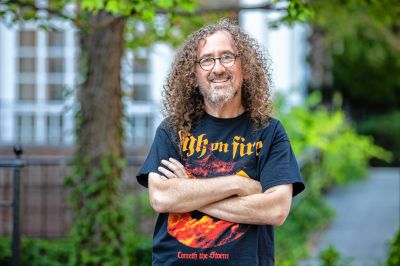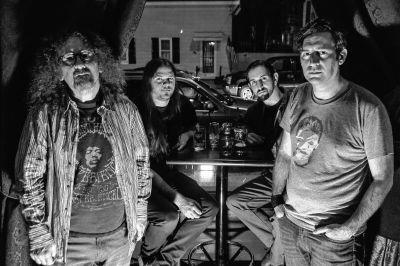By CAROLYN BROWN
Staff Writer

STAFF PHOTO/CAROLYN BROWN
Professor Steve Waksman poses for a photo outside Sage Hall at Smith College. Waksman will move to England in January to start a Leverhulme International Professorship at the University of Huddersfield, where he will research the ways that sound amplification technology has impacted music and culture.
After more than two decades at Smith College, a beloved music professor will say goodbye to Northampton with a farewell concert at the Iron Horse next week.
Professor Steve Waksman, who has taught at Smith for 23 years, will complete his last semester in December to start a Leverhulme International Professorship at the University of Huddersfield in England early next year. In his new role, he will receive £5 million (about $6.59 million) to conduct a five-year research project about how sound amplification technologies have impacted music, live events, political activism, and culture. After that five-year period, Waksman will take on a permanent position at the University of Huddersfield, a guarantee as part of his Leverhulme contract.
His farewell concert will be at the Iron Horse on Sunday, Sept. 29, at 7 p.m. The lineup includes Waksman’s band, The Electric Eyes, plus local bands Les Dérailleurs and Stock Goblin. Tickets are $15 in advance or $20 day-of.
At the University of Huddersfield, Waksman will work on what he’ll call “The Amplification Project” with a team of research fellows and graduate students. His interest in and previous research on amplification will inform this project; books he’s authored include a history of the electric guitar and a history of the connections between heavy metal and punk music, two genres in which loudness is crucial.
As Waksman points out, large-scale events like concerts and protest rallies are made possible because of amplification technology, which “allows a group of people to feel a sense of connection or solidarity with one another, with a performer or a speaker.”
“What does it mean when people are exposed to sound at a certain volume? How do musicians take advantage of the volume? And it’s not just about volume, but amplification changes sound. It changes timbre. It changes the actual texture of the sound in ways that [have] significant aesthetic implications, but it also has social implications,” he said.
Waksman expects that he and/or members of his team will produce books, articles, and at least one exhibit from their research.
Waksman, who was previously a WRSI radio host (“The Doctor of Rock,” a nickname created for him by Monte Belmonte, in reference to his encyclopedic musical knowledge), is also a local musician; his band The Electric Eyes, in which he plays guitar, fuses “punk, post-punk, indie, prog, and psychedelia,” according to a press release for their upcoming Iron Horse performance.
The Iron Horse show wasn’t originally intended to be a tribute to Waksman himself, he said. He and his bandmates, who reunited earlier this year after a pandemic hiatus, wanted to play a show together before Waksman left, but local promoter Glen Fant had the idea to bill it as a goodbye show to Waksman specifically.

PHOTO BY JULIAN PARKER-BURNS
Steve Waksman, left, poses with his band The Electric Eyes, who will be performing at the Iron Horse on Sunday, Sept. 29, at 7 p.m. The farewell concert’s lineup also includes local bands Les Dérailleurs and Stock Goblin.
“The show is people saying farewell and paying tribute to me, but it’s also me paying tribute to this place and how it’s allowed me to have a voice that I might not have had otherwise,” Waksman said.
“I really do think that living in Northampton and being at Smith has given me such a unique set of opportunities to develop a relationship with the town in a way that most academic scholars don’t get a chance to do, and I feel like the show is a representation of that,” he added. “I mean, how often does a rock venue decide to pay tribute to a professor at a local college or university? It’s not something that happens that often. It’s not to say that there aren’t professors who play gigs, but it’s different for somebody to actually be seen as having a voice that’s really part of the larger community.”
Waksman will continue teaching at Smith until the end of the semester, and he’ll move to England in early January. After 23 years at Smith, Waksman will miss Northampton, his students, and his fellow professors.
“Smith students are smart and curious, and they want to learn things, so it’s always been pretty pleasurable to get to teach here,” he said. “I’m definitely going to miss my colleagues, for sure. I have a lot of great colleagues, some of whom I’ve been working with for as long as I’ve been here. It’s not easy saying goodbye in that regard.”
Carolyn Brown can be reached at cbrown@gazettenet.com.


